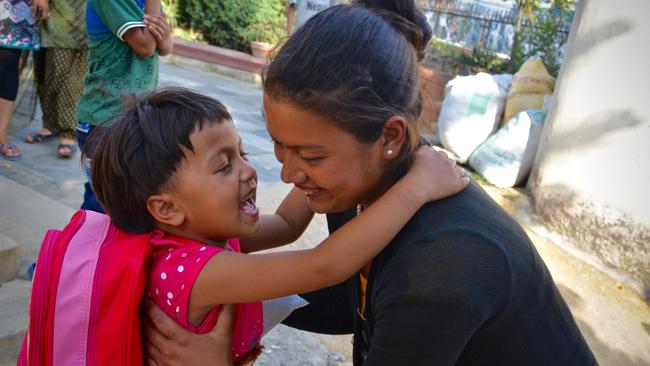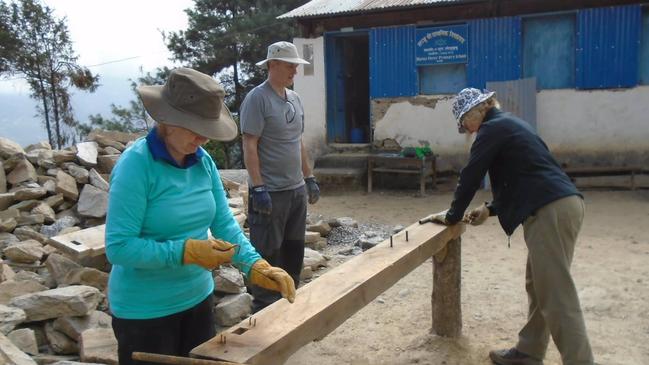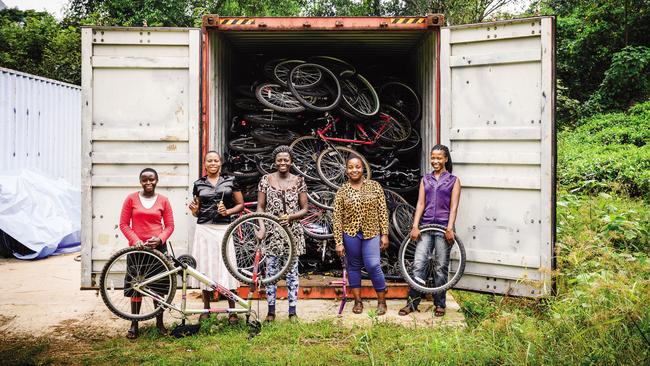Voluntourism: the hidden twists of trying to build a better world
‘Voluntourism’ can be a fulfilling way to see the world — but be careful, and do your research before you go.

Combining good works with your overseas travel seems like a perfectly altruistic adventure. Alas “voluntourism” is a road with twists and shocking turns, the worst being the discovery that tourists’ generous empathy for orphans created a child-trafficking racket in several countries. It’s now recognised that volunteering in orphanages feeds exploitation of children. It has been abolished by many organisations, is discouraged by the Australian government and soon may be banned.
All the same, says University of Technology Sydney associate professor Stephen Wearing, who has written extensively on volunteering, we should remember the decades of “excellent outcomes” from organised volunteer work through non-government organisations and churches. Commercial operators have changed the landscape, though he agrees “a lot do it well”. He is co-author of The International Volunteer Tourism Handbook, which is due out next year from Emerald Publishing and aims “to get people to think more about how they select … to do some research and find out a bit more about the programs, analyse what they do, evaluate what they’ve done, and approach it with a bit more serious structure”.
“If you can’t do it in Australia, you should seriously reconsider doing it overseas,” Forget Me Not’s Kate van Doore says. “If you couldn’t volunteer with vulnerable children here, why would you do it overseas? If you don’t have the skills to build a community hall in Australia, why would you do it overseas and remove jobs from locals? People need to think about it in the context of what they’d think was OK in Australia — that’s a good litmus test.”
All the same, she adds: “Don’t be put off visiting these beautiful parts of the world, but you don’t have to volunteer to help — boost the economy by being a tourist and spending your money there.”
Here are some of the organisations that work in the field:
Forget Me Not
The story of van Doore’s charity is a parable for the pitfalls of voluntourism, although lessons were learned. “We founded Forget Me Not in 2004 after a volunteer working in some Nepali orphanages discovered all sorts of corruption and exploitation, so we opened our own,” says van Doore, a children’s rights lawyer and lecturer at Griffith Law School. “But it turned out that our orphanage was used as a mechanism to remove children from their families.”
But in 2012, six years after Forget Me Not opened its Nepali orphanage, the group took over an orphanage in Uganda and found the children were “held in horrific conditions to attract our money”. But all were “paper orphans”; they had families. “The orphanage director had gone through the villages and recruited the children, telling their families they’d be educated in boarding school, but provided no schooling and terrible facilities. The children were having sugar and water for lunch. It was heartbreaking to discover that, for all of our good intentions, we’d essentially been duped.”
They investigated the Nepali orphanage and all 20 children also were found to have homes, “and all of them subsequently went home to loving families who’d been searching for them for years … We’d been told not to talk to the children about their parents because they were traumatised, and we fell for that.” Other organisations advised Forget Me Not to get out. “But we’d set up Forget Me Not to champion the rights of children, not to leave them in exploitative conditions,” says van Doore, “so we transitioned from orphanages to reunifying children with their families.”

World Expeditions
After the Boxing Day Tsunami in 2004, “we had an outpouring of people who wanted to be on the ground helping out”, World Expeditions’ responsible travel manager Donna Lawrence says. “That’s the worst thing you could have after a natural disaster; it’s a place for the experts and NGOs, not well-meaning but non-qualified people.” The next year, the group channelled travellers’ desire to do something meaningful for communities they were visiting into World Expeditions’ Community Project Travel.
“Travellers spend two or three days in communities working alongside the locals,” Lawrence says, stressing that CPT is about hard yakka. “Our most recent work has been after the 2015 earthquakes in Nepal, when we raised $250,000 through our foundation.” There were long-term local staff on the ground in Kathmandu, and some of those funds supported getting food staples and tarpaulins into communities that weren’t being reached in the early weeks, with the rest directed to rebuilding schools, especially in remote communities.
“More than 120 of our travellers have helped to rebuild four schools,” Lawrence says. “We hire local tradespeople to do the expert work and our travellers support them with rudimentary work like making human chains to carry bricks.” Although the organisation never had much involvement with orphanages, those projects were removed from its program in 2013 and World Expeditions now is a member of ReThink Orphanages, as is Forget Me Not. “We work really hard to ensure that the projects we do are needed in a community, and listen to them telling us what they need — a lot of it is around schools — and ensuring they have the other facilities, such as toilet blocks, to support whatever we build.”
worldexpeditions.com
communityprojecttravel.com
Earthwatch Institute
For anyone with a scientific itch but zero experience to scratch it, an Earthwatch Expedition could be a dream come true, from mapping biodiversity in Cuba to studying Peru’s giant manta rays, from tracking Asiatic wild dogs in Thailand to monitoring the health of the Daintree River or that of humpbacks in Moreton Bay, or studying climate change on Queensland’s tropical islands. The expeditions are scientifically based but no scientific background is required, Earthwatch Institute (Australia) chief executive Cassandra Nichols says. “You’ll be living and working with a scientist, and that’s one of the things that makes us unique.” Freshly minted research assistants (55-plus is the biggest age group) report equally loving the natural location, the learning aspect and the camaraderie of their fellow scientists, new and old. “You’re not just going to visit somewhere beautiful, you’re helping to collect data that we need to solve some of the pressing environmental problems facing our planet, so individuals who’ve contributed become more personally connected to the issue,” Nichols says. “We’ve seen people come back and quit their jobs, go back to university or get recycling policies changed in their company.” Expeditions are available in more than 26 countries, and range from one day to more than two weeks.

Inspired Adventures
A UN Women Australia breakfast sparked AIG chief executive Noel Condon to get the insurance company behind a Trek for Rights in Nepal, a charity challenge being run by Inspired Adventures. Founded by Australian Justine Curtis, Inspired Adventures travellers have raised more than $30 million for projects across 20 countries since 2005. AIG provided complimentary travel insurance for 44 charity trekkers this April and sent Melbourne-based staff member Shannen de la Motte, picked in a draw from about 60 employees Australia-wide who put their hands up to participate. Two treks raised more than $155,000, just shy of $4600 of it by de la Motte, who got to see where it was going. “UN Women work with local community organisations in Nepal, and we visited the head office of Restless Development, which is working on social justice issues for women there,” says de la Motte. She concedes she was nervous that she wasn’t “really an avid trekker … but we all took their time, there were people at all levels (and) it was more of a mental than a physical challenge”. The trekkers stayed in community lodges on their six-day trek and found “meeting the locals was a great privilege”.
Abercrombie & Kent Philanthropy
Luxury travel company Abercrombie & Kent, born as a safari operator in East Africa in 1962, has been involved in conservation projects since the early 1980s, more recently through its dedicated company A&K Philanthropy.
Today, AKP has about 35 social and environmental projects globally and recently added Australia to the list of countries where it is a registered charity. “It’s an important part of what we do,” Abercrombie & Kent Australia managing director Sujata Raman says. “Many of our itineraries include visits to our projects, such as a school in Tanzania or a well-digging project in Cambodia.”
AKP has supported kiwi conservation since 2009, and guests on tailor-made itineraries in New Zealand can include a kiwi encounter in Rotorua. “We’re actively looking for more projects in Australia and the region under one of our four pillars: health, conservation, education or enterprise, meaning community development,” Raman says. “We need it to be somewhere that our travellers can visit on the routes that we take because we want to get them engaged in our projects. That’s a key reason for them choosing to travel with us.”
A shipment of donated bicycles recently arrived from Western Australia for the Bwindi Women Bicycle Enterprise in Uganda, serving communities around the Bwindi Impenetrable National Park. “We want to encourage enterprise and get the community to improve their business skills,” Raman says. “We provide the first lot of bikes, after that the bikes are donated, but the shop has to make enough money to pay for the bulk of the transportation costs. Women run these particular bike shops, and they’re so enterprising.” Another bike project will kick off in Melbourne in November.

To join the conversation, please log in. Don't have an account? Register
Join the conversation, you are commenting as Logout